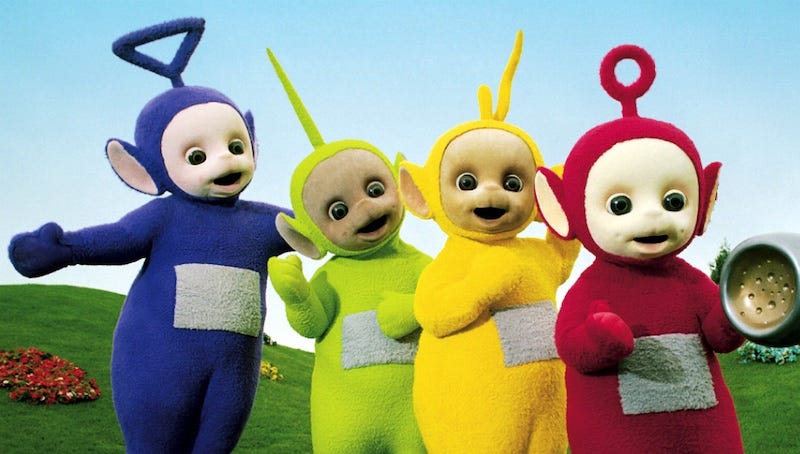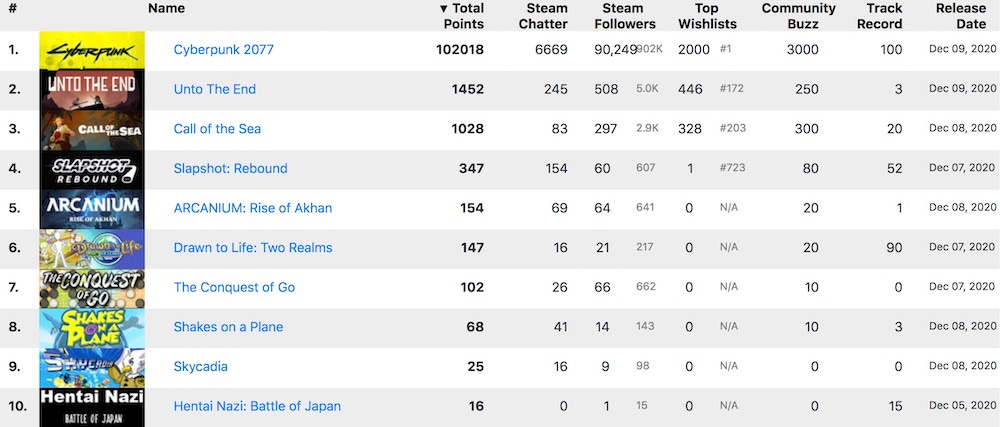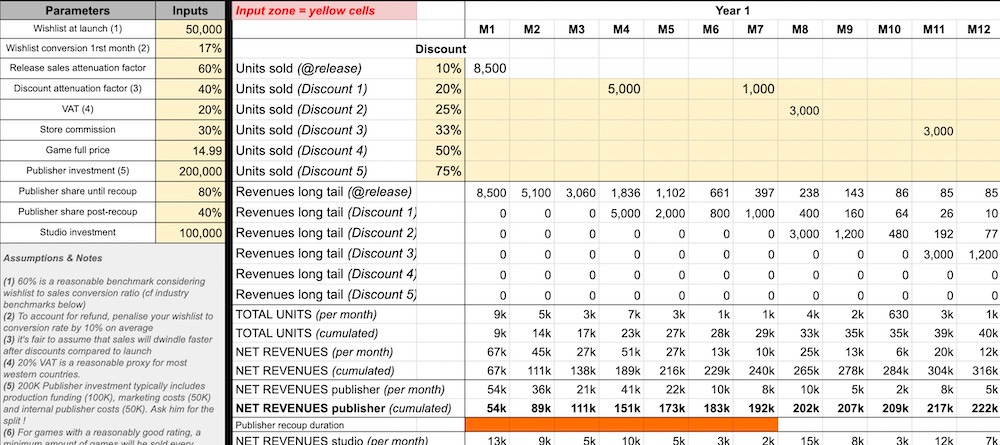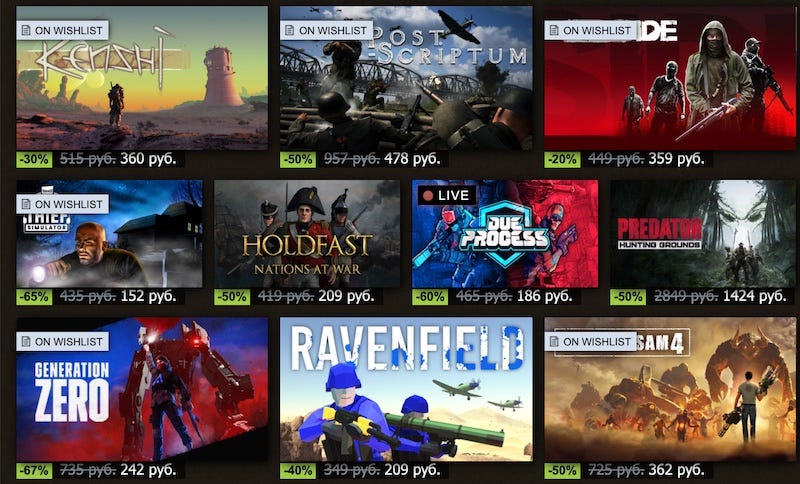Trending
Opinion: How will Project 2025 impact game developers?
The Heritage Foundation's manifesto for the possible next administration could do great harm to many, including large portions of the game development community.

Featured Blog | This community-written post highlights the best of what the game industry has to offer. Read more like it on the Game Developer Blogs or learn how to Submit Your Own Blog Post
We never really talked about which week and month it’s best to debut your game in to get noticed. And there’s a contrarian, over-simplistic answer on this, and then a more nuanced answer. You get both.

[The GameDiscoverCo game discovery newsletter is written by ‘how people find your game’ expert & GameDiscoverCo founder Simon Carless, and is a regular look at how people discover and buy video games in the 2020s.]
Somehow, it’s another week in game discovery land - so welcome back! Today I’m listening to ‘melancholic Sovietwave’ on YouTube and trying to work out if that music genre is fictional or not, while we handcraft a newsletter experience for you.
Hope your Steam Summer Sale experiences have been pleasant so far, by the way! We have a section on that later - and in the meantime, let’s get going with some thoughts on release timing.

Imagine - if you will - that these four Teletubbies represent different times of the year. Bobo is Spring, Fla-loo is Summer, Montoo is Fall, and Tipsy is Winter*. Which Teletubby should you be embracing to get the best discovery results for your game? (*I totally made these names up. This whole paragraph is silly. Sorry.)
We’ve previously talked about the best time of day to release games, concluding that on Steam, “most games launched between 6am and 10am West Coast time”. Although releasing even earlier in the day - if you’re based in Europe - can be even better for getting Chinese sales on release day.
But we never really talked about which week and month it’s best to debut in to get noticed. And there’s a contrarian, over-simplistic answer on this, and then a more nuanced answer. Starting with the over-simplistic answer, which was actually one I gave in the GameDiscoverCo Plus-exclusive Discord a few days ago:
“My general comment is 'any time of year that's not during a big Steam sale'. (And maybe it gets super crowded between the November and December Steam sales, because people want to get their game out before the end of the year.) Otherwise i think it's more about the fan base you built up, rather than the exact time of year.”
So the Internet is largely ‘time of year-agnostic’, unlike the retail era, where many boxed games were bought in time to be given to kids at Christmas. In the digital age, you don’t really want to debut at a time where the Steam front page has been majorly rearranged for a Summer or Winter sale. You will partially lose visibility boosts you would otherwise have access to (like ‘Popular New’, etc.)

But the more nuanced answer is: will the streamers you are targeting be distracted by hundreds of free, limited-time demos being mailed to them? If you think so, you might not want to launch your game in the first few days of a Steam NextFest.
And you might be worried about debuting the same week as a massive game like Cyberpunk 2077. (Above is the GameDiscoverCo Hype chart for the week of its Steam debut in 2020, something I called ‘the Cyberpunk avoidance zone’ at the time. Only two games with more than 1,000 Steam followers opted to come out that week!)
We haven’t even talked about release timing across multiple platforms. This can be complicated, because debuting console versions a long time after PC gives you issues around how to re-ignite interest in a title - there aren’t many Xbox or Switch-specific streamers.
Overall, GameDiscoverCo’s conclusion? Worry somewhat, but leading indicators of fan interest and overall game quality are far more important. Quirky psychological horror RPG OMORI launched on Xmas Day in 2020 (!?!), and has almost 17,000 Steam reviews - high hundreds of thousands of sales. If it can do that, anything is possible.

So, friend of the newsletter Stephane Rappeneau has a new Twitter thread introducing his very good new Google Sheets spreadsheet calculator based on estimating revenue cuts, and pub/dev shares for Steam game off wishlists, if you’re a dev OR publisher.
There’s been a few of these going around recently (and I’m hoping to debut another one from the publisher perspective soon!) Stephane notes: “I’ve seen lots of calculators but they are either very complex and specific, or too simple and do not account for long-tail and current industry benchmarks.”
He continues: “Who is this financial model for? Small studios wishing to quickly project their cash-flows up to 2 years after their release. This can be used as early as the publisher negotiation phase, and then updated every month as a proxy to anticipate financial problems (making sure cash burn is aligned with revenue sources).”
Pre-release, I did comment to Stephane that I thought his multi-year revenue model made the ‘long tail’ grimmer than I might expect. But he’s seeing it more from a ‘first year shows the general success/failure’ point of view, which is fair: “Any economic model is shit beyond 1 year, but a decay model is imo a reasonable proxy of the way a premium game behaves, especially as a risk management tool.”
And you do need to tweak all your ‘units sold when game is on sale’ estimates independently in this particular spreadsheet. So if you do that for the first year or two with realistic numbers, that’ll get you to an interesting/correct place. Great work here!

As mentioned above, the Steam Summer Sale is raging hard right now, including a cute interactive text adventure where you can “choose from two possible actions in each of the fourteen [genre-themed] Forge Your Fate stories found throughout the sale and receive an animated sticker as a memento of your decision.”
Some of the GameDiscoverCo Plus Discord crew are speculating that the top set of featured games are more personalized and algorithm-based than before. For example, Ivan from Hypetrain Digital supplied the above screenshot of part of this section - you can see how many of the suggested titles were already on his wishlist.
If you combine this with sections in the Summer Sale like ‘Players Like You Love’ and ‘DLC For Your Games’, as well as Steam trading card bonuses for exploring your Discovery Queue, it certainly seems like this sale is even more heavily tailored to players’ personal interests than normal.
So perhaps games with heavy and active wishlisting will do even better than average? As with any of this, we can’t see exactly how the algorithms highlight specific games - but we applaud Steam for actually trying to take players’ interests into account in sales. (Why don’t other platforms do this more?)

OK, finishing out here, there’s quite a lot going on, including multiple follow-ups from previous newsletters. So, direct from the GameDiscoverCo tiki basement here in California (yes, much newsletter writing is done from a tropical papasan), let’s have a hack through the news of the week so far:
In ‘the folks at Valve sigh and schedule a meeting after reading my newsletters’ news, looks like a bunch of people’s Steam regions got rolled back to their ‘real’ (current) country, following some of the recent publicity about players abusing inexpensive regions like Argentina to get cheap games. Right thing to do - and good use of that Michael Jordan GIF in the ResetEra thread, too.
GameDataCrunch supremo Lars Doucet just wrote a really nice editorial about the ‘instant games’ trend, Friday Night Funkin’ and all that good stuff, flashing back (haha!) to the Flash games scene. “The concept, supporting technology, and execution of "instant games" are all as old as dirt. Browser games of all shapes and sizes are easily two decades old. Today we have HTML5, before that we had Flash, before that we had Shockwave and Java applets. So why all this buzz now? What's changed?”
A follow-up to the game localization post in the form of this comment from Embracer Group advisor and former Raw Fury staffer Martin Lindell: “Brazilian Portuguese was an important addition for Kingdom. Also worth point[ing] out that Turkish is great for PC games, and for the right game Arabic, if you're doing PlayStation… [I believe] there's more PS4 consoles in Middle East than in Southeast Asia (excluding Japan) and Latin America.” Great point - we got a separate comment that Arabic x PlayStation is a good move.
OMG, the amount of Xbox news is constant recently - partly ‘cos Microsoft is in constant motion towards “bring[ing] the joy and community of gaming to everyone on the planet”. (Have I mentioned I dislike $2 trillion capitalized corporations running overly humanistic marketing?) Anyhow: Xbox Cloud Gaming is now running on browser on iOS & PC in 22 countries, powered by custom Series X hardware & Game Pass. (Stadia going ‘ouch’ over there.)
Bonus: yep, Windows 11 has been revealed. And in addition to oddness like Android apps being usable on the Windows 11 OS, and the Microsoft Store allowing devs to keep 100% of revenue, except for games, there’s a ‘Windows 11 is the best for gaming’ post on Auto HDR, DirectStorage, and [of course] Game Pass. All seems pretty reasonable, actually.
Just finishing the Microsoft trifecta, since I’ve been storing this one up for a while… look, this Satya Nadella quote - “we believe that Microsoft can play a leading role in democratizing gaming.” For the players… I get it. For the devs, however… democratizing what, Satya? Is pitching to everyone’s new gatekeepers at Microsoft as ‘democratizing’ as just releasing your game on Steam? Or you can just sell your game to f*cking Aquaman, I guess. (This is a metaphor.)
Microlinks: on localization, here’s “some of the things that surprised me as the UI programmer supporting localization of an Unreal Engine 4 game [Industries Of Titan]”, an interesting postmortem of Mixolumia, that rare title that did better on Itch than Steam; disturbingly, Steam key resellers G2A now have a ‘G2A Plus’ paid subscription, with free games & discounts on their dubiously sourced codes.
The folks who made the Codecks project management tool for game devs have just announced Steamy, the Discord Steam bot for game developers. You can “receive [Steam review] notifications about one or multiple games directly on your Discord server… to a private or public channel.” And there’s “Support for more notifications (hot forum threads, new workshop items) coming soon!” Love it.
Misc: another good A16Z Future game article, this time from Joost Van Dreunen on ‘the creator economy coming for video games’. Overwolf is getting deep ($29m!) into the ‘paid modding’ community, talking of the creator economy; courtesy of Ampere’s Chundi Zhang, a heads up on the treacle-slow Chinese gov approvals for ‘foreign’ games - Hay Day, The Division 2 & Mario + Rabbids Kingdom Battle among them.
[We’re GameDiscoverCo, a new agency based around one simple issue: how do players find, buy and enjoy your premium PC or console game? You can subscribe to GameDiscoverCo Plus to get access to exclusive newsletters, interactive daily rankings of every unreleased Steam game, and lots more besides.]
Read more about:
Featured BlogsYou May Also Like